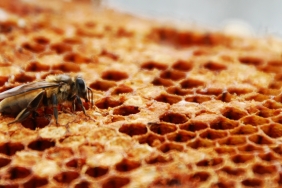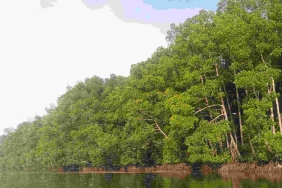WWF HELPS DEVELOP "WALABI" CAJUPUT OIL BUSINESS
By: Masayu Yulien Vinanda
Merauke (21/09)-Wasur National Park has great potential for non timber forest commodity, 70 percents of the area are naturally overgrown with this cajuput trees belonging to Melaleuca cajuputi species. If they are well developed, they can support the economy of the local communities. This is what WWF-Indonesia Merauke office has been striving after since early 1990s.
Working with the communities and local government, WWF gives assistance by conducting training of sustainable cajuput oil and distillation methods, field study to Buru Island, Maluku (one of the most popular cajuput oil producer) and stimulates the existing groups of cajuput oil producers from the local communities and develops market for the cineole-rich cajuput oil.
According to WWF-Indonesia Papua Office’s Community Empowerment Coordinator Paschalina Ch. M Rahawarin, one of the strategies to encourage local people producing cajuput oil is by establishing the best group system. Various systems had been tested in order to achieve the best strategy for motivating the locals and increasing the productivity of Wasur cajuput oil.
“At first we arranged mixed group, the members were from various clans. But in the process this didn’t work out. One of the causes was the unfair benefits distribution among the members. Then, we turned the system into clans group. For instance members of Mbanggu group were all originated from Mbanggu clan. But again, this didn’t always run smoothly. Then, we revised the system by establishing the group of nuclear family. Every group consists of father, mother, and children. This family harvest leaves of Melaleuca cajuputi then distill them after fermenting for a night. During our work, I think this is the most suitable technique. So the clan group is only for setting the distillation instrument, the locals then make their distillation schedule,” she added.
Besides implementing this family system, WWF also uses motivators to empower the locals. They are traders who live in the village. Interestingly, the three motivators in one of the “Yanggandur” village are outsiders who have been living with the locals for years. They motivate the locals to produce cajuput oil, buy the leaves from the locals then extracted the oil by distilling it. Subsequently, the cajuput oil is sold to Wasur Lestari Foundation (YWL).
The leaves transaction at the distillation places is not always paid by cash. Sometimes the locals prefer barter system by exchanging their leaves with some domestic needs such as rice, sugar, coffee, and many more. The leaves are valued at 500-600 rupiahs per kilogram. “There price has increased. At the beginning the leaves price was 75 rupiahs per kilogram, then it climbed up to 100 rupiahs, 150 rupiahs, 300, 400. Now, it has reached 600 rupiahs. We expect the price will get better since harvesting cajuput leaves is not an easy thing to do. Moreover we have to carry the leaves on the shoulders to the distillation center, and it takes a long walk,” said Mikael, the local who has been producing cajuput oil since 1991.
Meanwhile to expand the market, WWF has developed partnership with Djasulawangi,Inc. in Jakarta, a leading producer and exporter of quality essential oils, vanilla beans and clove leaf oil derivatives from Indonesia. “The company is ready to absorb our products, and we have explained them that this product comes from the local communities in Merauke. It is only possible for us to send the oil every 2-3 months since we have to collect it from all sources. We usually ship 200-300 kilos,” Paschalina said. WWF still tries to maximize the existing potential in Wasur NP and sustain the new production of cajuput oil while at the same time protecting the park ecosystem and cajuput forest.
“Wasur has great potential for cajuput commodity. It has premium quality. It consists of 60 % cineol. So why don’t we develop the industry in other villages? The local, national, and international market for the Cajuput oil is still wide opened. What we need to accelerate this is support from many parties such as the local government. Great efforts need to be enhanced for instance by giving more intensive and continuous assistance for the local communities. As a result they can obtain alternative income to raise their standard of living,” she said.





